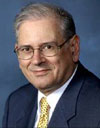- President's Cabinet
- Executive Office of the President
- USA Freedom Corps
- Faith-Based & Community
- Office of Management and Budget
- National Security Council
- Citizens' Handbook
- Federal Agencies & Commissions
- Federal Statistics
- Afghanistan
- Africa
- Budget Management
- Defense
- Economy
- Education
- Energy
- Environment
- Global Diplomacy
- Health Care
- Homeland Security
- Immigration
- International Trade
- Iraq
- Judicial Nominations
- Middle East
- National Security
- Veterans
|
Home >
Government
|
Dr. Vinton Cerf and Dr. Robert Kahn
Medal of Freedom Recipients
Dr. Vinton G. Cerf Vinton G. Cerf is vice president and Chief Internet Evangelist for Google. He is responsible for identifying new enabling technologies and applications on the Internet and other platforms for the company. Widely known as a "Father of the Internet," Vint is the co-designer with Robert Kahn of TCP/IP protocols and basic architecture of the Internet. In 1997, President Clinton recognized their work with the U.S. National Medal of Technology. In 2005, Vint and Bob received the highest civilian honor bestowed in the U.S., the Presidential Medal of Freedom. It recognizes the fact that their work on the software code used to transmit data across the Internet has put them "at the forefront of a digital revolution that has transformed global commerce, communication, and entertainment." From 1994-2005, Vint served as Senior Vice President at MCI. Prior to that, he was Vice President of the Corporation for National Research Initiatives (CNRI), and from 1982-86 he served as Vice President of MCI. During his tenure with the U.S. Department of Defense's Advanced Research Projects Agency (DARPA) from 1976-1982, Vint played a key role leading the development of Internet and Internet-related data packet and security technologies. Since 2000, Vint has served as chairman of the board of the Internet Corporation for Assigned Names and Numbers (ICANN) and he has been a Visiting Scientist at the Jet Propulsion Laboratory since 1998. He served as founding president of the Internet Society (ISOC) from 1992-1995 and was on the ISOC board until 2000. Vint is a Fellow of the IEEE, ACM, AAAS, the American Academy of Arts and Sciences, the International Engineering Consortium, the Computer History Museum and the National Academy of Engineering. Vint has received numerous awards and commendations in connection with his work on the Internet, including the Marconi Fellowship, Charles Stark Draper award of the National Academy of Engineering, the Prince of Asturias award for science and technology, the Alexander Graham Bell Award presented by the Alexander Graham Bell Association for the Deaf, the A.M. Turing Award from the Association for Computer Machinery, the Silver Medal of the International Telecommunications Union, and the IEEE Alexander Graham Bell Medal, among many others. He holds a Ph.D. in Computer Science from UCLA and more than a dozen honorary degrees.
Dr. Robert E. Kahn
Robert E. Kahn is Chairman, CEO and President of the Corporation for National Research Initiatives (CNRI), which he founded in 1986 after a thirteen year term at the U.S. Defense Advanced Research Projects Agency (DARPA). CNRI was created as a not-for-profit organization to provide leadership and funding for research and development of the National Information Infrastructure. After receiving a B.E.E. from the City College of New York in 1960, Dr. Kahn earned M.A. and Ph.D. degrees from Princeton University in 1962 and 1964 respectively. He worked on the Technical Staff at Bell Laboratories and then became an Assistant Professor of Electrical Engineering at MIT. He took a leave of absence from MIT to join Bolt Beranek and Newman, where he was responsible for the system design of the Arpanet, the first packet-switched network. In 1972 he moved to DARPA and subsequently became Director of DARPA's Information Processing Techniques Office (IPTO). While Director of IPTO he initiated the United States government's billion dollar Strategic Computing Program, the largest computer research and development program ever undertaken by the federal government. Dr. Kahn conceived the idea of open-architecture networking. He is a co-inventor of the TCP/IP protocols and was responsible for originating DARPA's Internet Program. CNRI provides the Secretariat for the Internet Engineering Task Force (IETF). Dr. Kahn also coined the term National Information Infrastructure (NII) in the mid 1980s which later became more widely known as the Information Super Highway. In his recent work, Dr. Kahn has been developing the concept of a digital object architecture as a key middleware component of the NII. This notion is providing a framework for interoperability of heterogeneous information systems and is being used in many applications such as the Digital Object Identifier (DOI). He is a co-inventor of Knowbot programs, mobile software agents in the network environment. Dr. Kahn is a member of the National Academy of Engineering and a former member of its Computer Science and Technology Board, a Fellow of the IEEE, a Fellow of AAAI, a fellow of ACM. He is a former member of the President's Information Technology Advisory Committee, a former member of the Board of Regents of the National Library of Medicine and the President's Advisory Council on the National Information Infrastructure. He is a recipient of the AFIPS Harry Goode Memorial Award, the Marconi Award, the ACM SIGCOMM Award, the President's Award from ACM, the IEEE Koji Kobayashi Computer and Communications Award, the IEEE Alexander Graham Bell Medal, the IEEE Third Millennium Medal, the ACM Software Systems Award, the Computerworld/Smithsonian Award, the ASIS Special Award and the Public Service Award from the Computing Research Board. He has twice received the Secretary of Defense Civilian Service Award. He is a recipient of the 1997 National Medal of Technology, the 2001 Charles Stark Draper Prize from the National Academy of Engineering, the 2002 Prince of Asturias Award, and the 2004 A. M. Turing Award from the Association for Computing Machinery. He has received honorary degrees from Princeton University, University of Pavia, ETH Zurich, University of Maryland, George Mason University, and the University of Central Florida, and an honorary fellowship from University College, London. Dr. Kahn received the 2003 Digital ID World award for the Digital Object Architecture as a significant contribution (technology, policy or social) to the digital identity industry. 
Vice President and Chief Internet Evangelist, Google

Chairman, CEO and President, Corporation for National Research Initiatives (CNRI)



